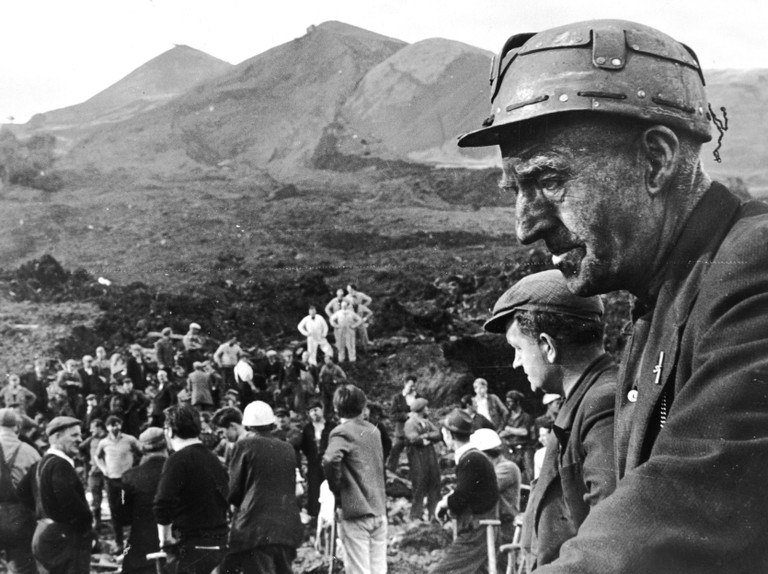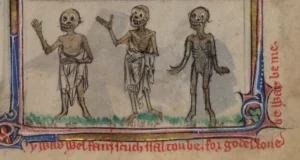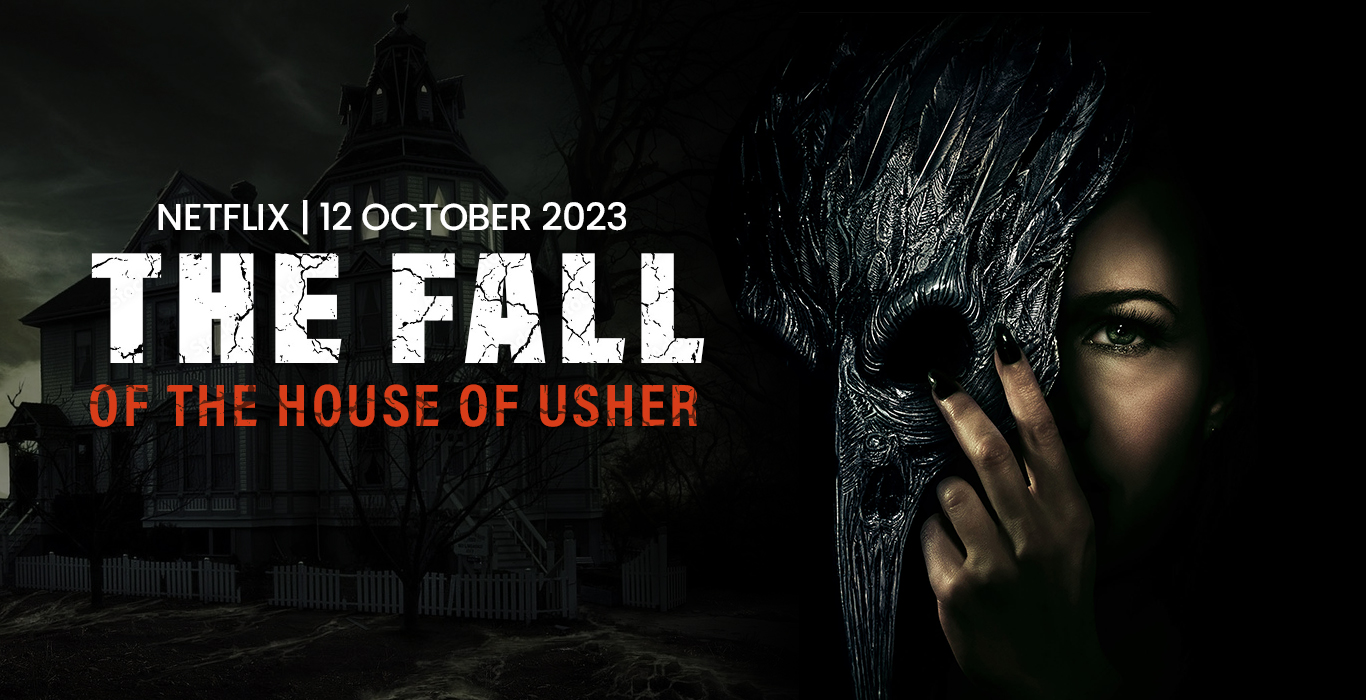This blog exists, in part, due to David Starkey. Young me was studying at a time when Starkey was considered the absolute authority on Tudor history. He’d written a definitive study of Elizabeth I and had yet to call Catherine Howard a ‘silly little slut’. This week, he appeared on GB News (no comment) for an interview on Black History Month. I won’t get into the red flags sent up when two gentlemen of a certain age, class, colour, and disposition discuss Black History Month on a channel that advertises itself as detrimental to ‘snowflakes’ because it wasn’t actually his comments about BLM that I took issue with.
It was the bit where he described the Aberfan disaster as an act of God.
If you’d like to watch the interview (which runs to ten minutes in this clip) it’s here:
And if you don’t want to watch it, here’s a brief transcript of the offending section:
Brazier: David, historians are always sorting aren’t they? I mean, you’re sorting wheat from chaff all the time, and they’ve got to be–
Starkey: Well–
Brazier: But let me make this point, it’s got to be necessarily by subjective criteria. So for instance, I cited two examples there of in our industrial history. Some people find industrial history a bit boring compared to interesting wars or subjugations or whatever else it is but those two items of historical history which tell really important stories about the communities of South Wales and the Scottish borders, largely uncommemorated today. Is that because, actually industrial accidents aren’t very interesting, they just happen or because there’s been an active act of forgetting?
Starkey: I don’t think it’s that. Usually in those industrial accidents that you describe, certainly one of them was simply an act of God. Putting to sea in the hurricane, I know well–
Brazier: Well, let me- I’m really going to enjoy this, because I’m going to correct you, David. Actually, the whole of Scotland knew there was bad weather coming, a terrible European hurricane all over the North Sea and only the ports of Eyemouth and a couple of others on that Berkshire coast went to sea because they were skint and needed the money. So there is a story to be told.
Starkey: There is a story to be told but it’s still an act of God. So much of course about the history of disasters is you want to learn a lesson. It’s not a terribly important lesson learning don’t go out in a hurricane. But even Aberfan has largely receded whereas of course Dresden, man-made, man-inflicted, from which you can draw political lessons looms large.
Calling Aberfan an act of God rather than man-made, man-inflicted, and something you can draw political lessons from is a bold claim. Calling it such a thing the week of the event’s 55th anniversary is frankly, offensive. As was the particularly egregious pronunciation of Aberfan. The disaster itself was entirely man-inflicted and the aftermath could be a masterclass in corrupt politics. It isn’t even true that interest in the disaster has receded, given that until its recent appearance as the focus of an episode of The Crown, a lot of people outside of Wales had never even heard of it. If you’re still one of those people, then you’re in for a treat. A harrowing, harrowing treat.
The year is 1966 and several spoil tips, made up of gathered mining waste, loom over the Welsh village of Aberfan. At 9:15 on October 21st, one of the tips (Tip 7) shifted as a result of recent rainfall and slid down the hillside. In a matter of minutes, 190,000 cubic yards of spoil crashed into the village below. The waste took out two farms, an entire street, but most tragically Pantglas Junior School which had only opened its doors for morning registration minutes before the disaster occurred. The result was the death of twenty-eight adults and one hundred and sixteen children.
Rescue efforts began within thirty minutes as miners rushed to the site and tried to dig out their children buried under the landslide. No survivors were found after 11 am and it took a further week before all the bodies were recovered.
If we consider how far the disaster could be described as an act of God, it isn’t very far. In fact, the only elements that were in any way natural and not inflicted by man, was the rainfall that preceded the event. In theory, amount of rain caused the tip to become unstable. In practice, the rainfall exacerbated the existing instability of the tip’s foundation. Instability that, incidentally, said man who inflicted the tip was very much aware of.
I talk about the disaster as man-made but I’m not speaking of some kind of nebulous concepts such as the march of progress, or industrialization and its effects on small communities. I’m specifically talking about the National Coal Board with particular blame for its chairman Alfred Robens, Baron Robens. The disaster was entirely of their creation and an early example of corporate murder. Starkey suggests that there are no political lessons that can be taken away from such a disaster, so let’s have a rundown of the political implications of the build-up, the disaster, and the aftermath.
The Buildup
- Tips 4, 5, and 7 were all established on bodies of water in direct contravention of the NCB’s own policies.
- Tip 7 had been commissioned in 1956 by the NCB who then appointed a group manager, Ronald Neal Lewis, and a mechanical engineer, Joseph Baker to determine the site of the tip. Neither of these men had any background in the factors necessary to the task. No surveys were taken, no geologists were consulted, no guidance was sought, and it was later revealed that the men hadn’t even gone as far as looking at a map before choosing the site.
- Ultimately, tip 7 was created on the site of a previous collapse, when the natural instability of the site caused tip 4 to collapse in 1944.
- The 1944 collapse was not reported to the NCB because nobody had been hurt.
- At the time, the UK had no regulations to govern the maximum height a coal tip could reach.
- From 1952, residents reported that the floodwater in their village was black from the spoils and left behind a stained, greasy residue.
- From 1959 the local council began contacting the NCB to express their concerns about the tip situated above Pantglas Junior School.
- In May 1963 tip 7 shifted followed by a considerable landslide in the following November. The NCB determined that the finer waste known as tailings would no longer be added to the tip, but regular waste continued.
- Also in 1963, an engineer wrote to the NCB describing how the tip would not be able to maintain its integrity in the event of heavy rainfall. The school petitioned the NCB to visit the tip so its dangers could be assessed.
- In 1965 the NCB, consented to meetings with the council in order to discuss action and agreed to deal with the cause of the flooding reported from thirteen years earlier. No work was undertaken.
The Disaster
- At 7:30 am the colliery’s morning shift discovered that tip 7 had shifted significantly. Unable to telephone the charge manager because the telephones had been removed, one of the group began the trek to the colliery to report in person.
- At 9am he returned with a team to recover railings that had fallen into the depression caused by the movement. They found that the depression had doubled in size and agreed no further spoils be added.
- At 9:15 the workers retired for a cup of tea, but witnessed the landslide as they moved away.
- At 9:20 the colliery siren rang out to alert the miners to the disaster, and calls began to be made to emergency services.
- Later that morning, the chairman of the NCB, Baron Robens, was told of the disaster. He decided it didn’t require his attention and instead remained at the University of Surrey for two days, where he was being invested as Chancellor. When the Secretary of State for Wales contacted the NCB to ask where Robens were, his colleagues reported that he was at Aberfan and had been since he’d heard of the disaster.
- The Prime Minister, Harold Wilson, visited that evening and determined that a high-level inquiry would investigate the causes of the disaster.
- That same evening the mayor officially asked for donations to what would become the Aberfan Disaster Fund to help the families of the victims and rebuild the area.
- Robens publicly stated that it was impossible for anyone to have known of the underground springs which had been included on local maps and OS surveys since the late 1890s.
The Aftermath
- The resulting tribunal promised by Wilson lasted almost eighty days because the NCB refused to cooperate despite Robens’ promises that they would.
- Robens’ own testimony at the inquiry was inconsistent and sometimes factually incorrect. The NCB legal representation had the tribunal disregarded his statements as evidence.
- The MP for Aberfan gave evidence to say that the tip sliding and reaching the village had long been a concern. This too was struck from the record.
- The Government’s Inspectorate of Mines was found to have acted in such a way during its inspections that protected the NCB at the expense of Aberfan.
- The tribunal ruled that the NCB was solely at fault in a report that was made available to Robens before it was officially published, allowing the NCB to begin their damage control. Despite the tribunal’s censure of the board, the NCB wasn’t prosecuted or held accountable in any way beyond the public opinion of Aberfan. The board members, including Robens either retained their position or were promoted.
- The NCB considered Robens’ tenure as its most successful, celebrating his many policies that resulted in mass unemployment, pit closures, and low wages. Aberfan isn’t mentioned.
- The Aberfan Disaster Fund reached £1.75 million but was not accessible to the residents. Initially, it was determined that the people of Aberfan wouldn’t know how to spend their compensation were they to receive it. Then they were denied access to funds that would pay for the mass gravestones. Eventually, fixed sums of £100 were granted to those who lost houses.
- The NCB was required to offer compensation the bereaved families. The initial sum of £50 was rejected and raised to £500 if the parents could prove that they had been sufficiently close to their children.
- Despite the recommendations of the tribunal’s report, none of the safety measures were implemented with the exception of a single amendment to the Mines and Quarries Acts. The NCB insisted that the remaining tips were safe after the village petitioned for their removal but the appeal was rejected. The villagers who protested at the NCB’s Welsh offices were arrested. Robens himself protested at the Treasury that the NCB should pay for the removal. The government also refused and it was decided the money should come from the Disaster Fund. The initial request for quarter of a million pounds was reduced to £150,000 and removed in direct contravention of charity law. The Charity Commission made no objection.
- In 1972 Robens was appointed the chair of a commission into health and safety at work.
- Thirty years later, the British government would finally address the issue of outright theft from the Aberfan Disaster Fund by paying back the money. In 1997, the £150,000 was returned without adjustment for inflation, interest, or the effects of decimilisation.
- More recently, in 2007, the Welsh government made a donation to represent the adjustment.
In conclusion, as far as politics goes, the NCB ignored decades worth of protests and complaints, they ignored their own policies and safety rules. They were found to be at fault for the disaster but nobody was prosecuted and nobody was so much as demoted. The recommendations by the tribunal were not followed and aid money was withheld or illegally removed without a care for the people of Aberfan. 144 people died because of corporate neglect and the survivors were left without help or assistance from the institutions put in place for that purpose. This was not an act of God. In fact, the rain that preceded the event hadn’t even exceeded the expectations of the season.















